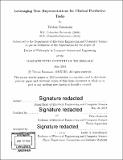Leveraging text representations for clinical predictive tasks
Author(s)
Naumann, Tristan
DownloadFull printable version (9.648Mb)
Other Contributors
Massachusetts Institute of Technology. Department of Electrical Engineering and Computer Science.
Advisor
Peter Szolovits.
Terms of use
Metadata
Show full item recordAbstract
The increasing prevalence of digitized clinical data creates new opportunities to use machine learning to unlock clinical insights, and ultimately improve healthcare delivery. However, while data from Electronic Health Records (EHRs) have become common, they present unique challenges. Clinical data are noisy, sparse, irregularly sampled, and often biased in their recording of health state and care patterns. Further, much of the most important information used by care staff is recorded in unstructured text notes that are not easily deciphered by non-experts. In this work, we present machine learning methods that distill large amounts of text-based clinical data into latent representations. These representations are then used to predict a variety of important outcomes. In particular, we focus on prediction tasks that can provide evidence-based risk assessment and forecasting in settings with guidelines that have not traditionally been data-driven. We consider several abstractions for clinical narrative text, and evaluate their utility on common predictive tasks, such as mortality and readmission. We argue that a "good" representation will improve performance on these tasks and that multiple representations may be necessary, as different models excel on differing tasks. We present three case studies in which we use representations of clinical text to improve performance of clinical prediction tasks. First, we augment predictive models that used baseline clinical features by including features from clinical progress notes [31].These features are derived using Latent Dirichlet Allocation (LDA) and incorporated as features using per-patient topic membership. Notably, this representation has the benefit of interpretable topics over which each patient can be represented as a distribution. Second, we explore the expressive power of clinical prose by evaluating the performance of several common models on both downstream clinical tasks and their ability to identify information contained in patients' notes [7]. This stands in contrast to much prior work that positions the utility of a given model solely with respect to its ability to improve downstream clinical performance. Such extrinsic evaluations are blind to much of the insight contained in the notes, thus motivating the need for intrinsic evaluations. Finally, we use the text-based metadata associated with EHR encodings to allow the transfer of predictive models from one database to another [35]. Existing machine learning methods typically assume consistency in how semantically equivalent information is encoded. However, the way information is recorded differs across institutions and over time, often rendering potentially useful data obsolescent. To address this problem, we map database-specific representations of the information to a shared set of semantic concepts, thus allowing models to be built from or transition across different databases.
Description
Thesis: Ph. D., Massachusetts Institute of Technology, Department of Electrical Engineering and Computer Science, 2018. Cataloged from PDF version of thesis. Includes bibliographical references (pages 93-102).
Date issued
2018Department
Massachusetts Institute of Technology. Department of Electrical Engineering and Computer SciencePublisher
Massachusetts Institute of Technology
Keywords
Electrical Engineering and Computer Science.